Boris Johnson: Final curtain on a dramatic career?
- Published
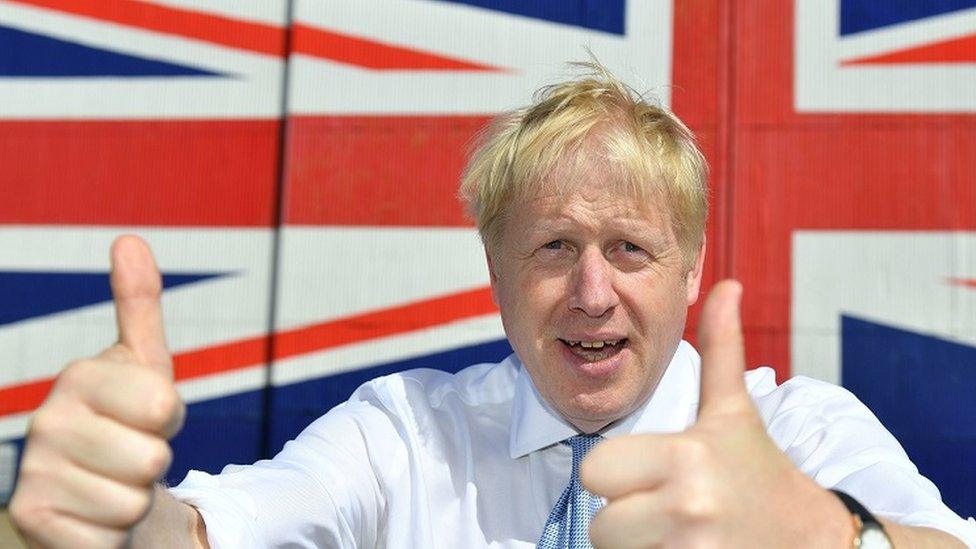
Could this really be the end?
Boris Johnson's latest departure from Parliament has a feeling of finality about it.
The last time he stood down as an MP, in 2008, it was in triumph. He had just been elected mayor of London, a job that would launch him on the path to Downing Street.
Now he is heading for the exit with all guns blazing, with a scathing attack on the MPs who sought to punish him for misleading Parliament over Covid rule-breaking.
His reaction to the Privileges Committee report, external is vintage Johnson - colourful, amusing in parts - the references to "Mystic Meg" and nudist colonies - but with an unfamiliar edge of bitterness and anger.
Whether it turns out to be the final raging testament of a man destined for the political wilderness remains to be seen.
He has bounced back from many, mainly self-inflicted, disasters before.
And he is clearly in no mood to settle for comfortable semi-retirement.
He has already earned more than £5m for giving speeches around the world since he quit as prime minister.
He is also about to become a father again, at 58, with wife Carrie expecting their third child. The family have just moved into a £3.8m Grade II listed manor house in Oxfordshire, complete with its own moat.
There are books to write - his memoir of his time in Downing Street is well under way apparently, and talk of business opportunities.
But this may be thin gruel for someone with Boris Johnson's outsize personality.
'Exception'
From his earliest childhood days, when he famously declared he wanted to be "world king", Alexander Boris de Pfeffel Johnson has had his eyes on life's big prizes.
He came into the world in 1964 in the Upper East Side of Manhattan, in New York, where his father, Stanley, was studying economics.
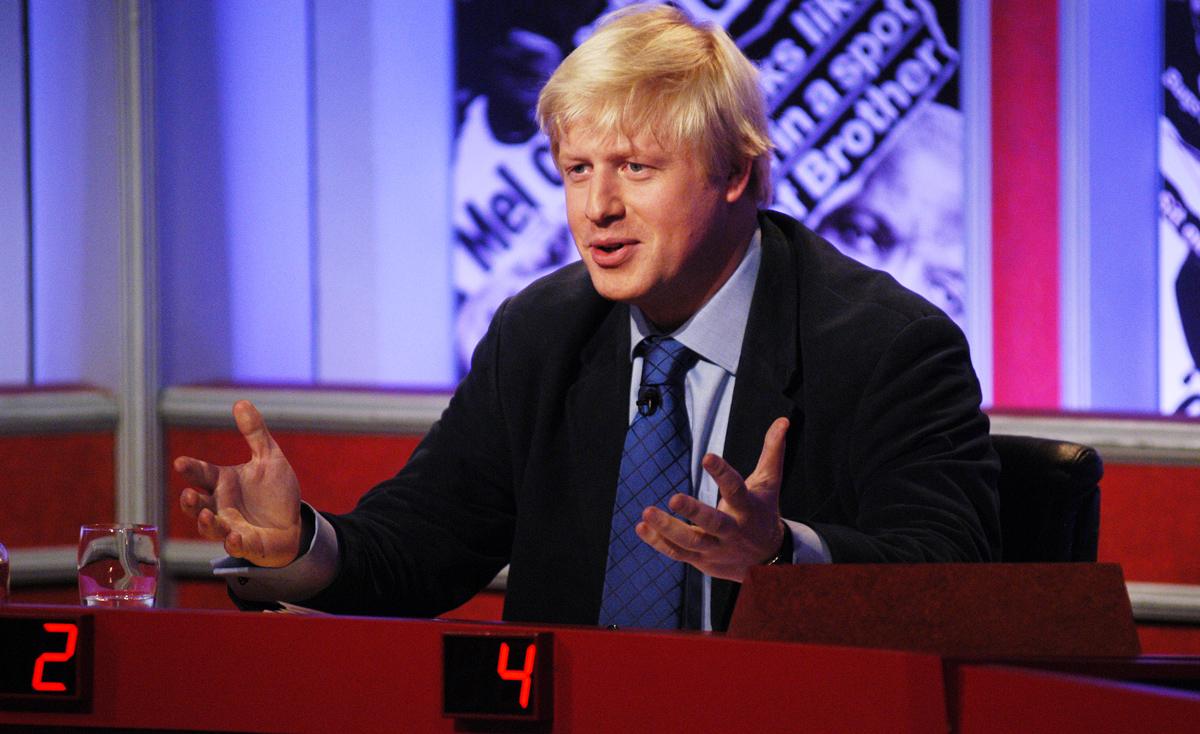
Boris Johnson as host of the BBC show, Have I Got News For You, in 2002
One of four children, he spent his early years on the family farm in Somerset, before moving to north London and then Brussels, where Stanley was working for the European Commission.
The Johnson siblings were close and highly competitive with one another. Young Boris, or Al, as he was known to the family, was largely brought up by his artist mother Charlotte, helped by au pairs.
He won a scholarship to Eton College, England's most prestigious private school, where he made a lasting impression on his teachers and classmates.
In a widely quoted excerpt from a school report, teacher Martin Hammond said of the 17-year-old Johnson: "Boris sometimes seems affronted when criticised for what amounts to a gross failure of responsibility.
"I think he honestly believes it is churlish of us not to regard him as an exception, one who should be free of the network of obligation which binds everyone else."
Rowdy and exclusive
Simon Veksner, a school friend of Johnson, told author Simon Kuper in his recent book Chums: "Boris's charisma even then was off the charts, so funny, warm, charming, self-deprecating,"
At Oxford University, he was elected president of the union - a debating society dating back to 1823. He also joined the infamously rowdy and exclusive Bullingdon Club, alongside future prime minister David Cameron.
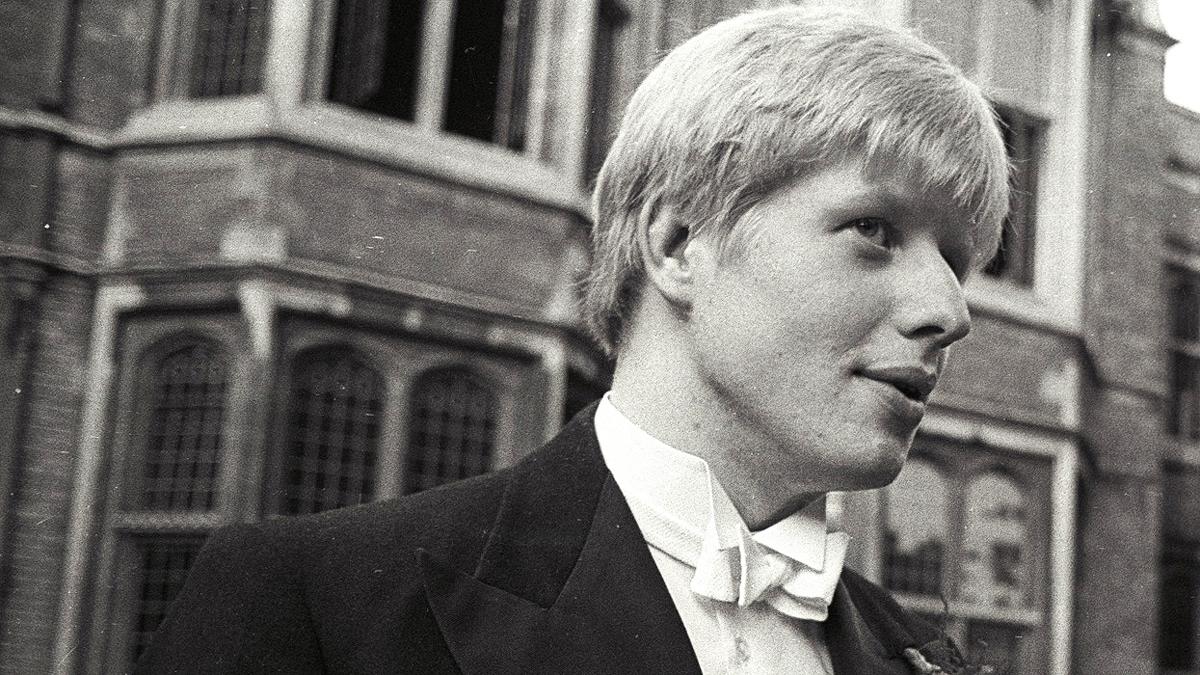
Brimming with ambition: Boris Johnson was president of the Oxford Union in 1986
After Oxford, he was taken on as a trainee reporter at the Times newspaper, but was sacked after falsifying a quote.
It proved to be a minor setback however, and in 1988 he was given a job on the Daily Telegraph by then-editor Max Hastings.
As the Telegraph's Brussels correspondent, Johnson specialized in ridiculing regulations passed by the European Commission - although many of his fellow reporters in Brussels felt his stories were exaggerated and in some cases simply untrue.
In 1999, he became editor of influential right-wing magazine the Spectator, and two years later finally achieved his ambition to enter Parliament, as the Tory MP for Henley, in Oxfordshire.
Things did not go smoothly.
He insisted on continuing to edit the Spectator, even when he was promoted to the Tory frontbench by then leader Michael Howard.
'Scouse grovel'
He came unstuck in 2004 when the magazine published an article blaming the Hillsborough disaster on the behaviour of Liverpool football fans.
An incensed Howard ordered Johnson to Liverpool to apologise to the entire city.
He survived "Operation Scouse Grovel", as he dubbed it, only to be sacked by Howard a month later for lying about claims he had had an affair with journalist Petronella Wyatt.
Johnson's colourful private life has long been a source of fascination for fellow journalists - in particular, the question of how many children he has fathered.
He has declined to confirm a number when asked, but it is thought be seven, with another on the way.
He has four children from his second marriage, to barrister Marina Wheeler, which ended in divorce, and another from an affair with art consultant Helen Macintyre.
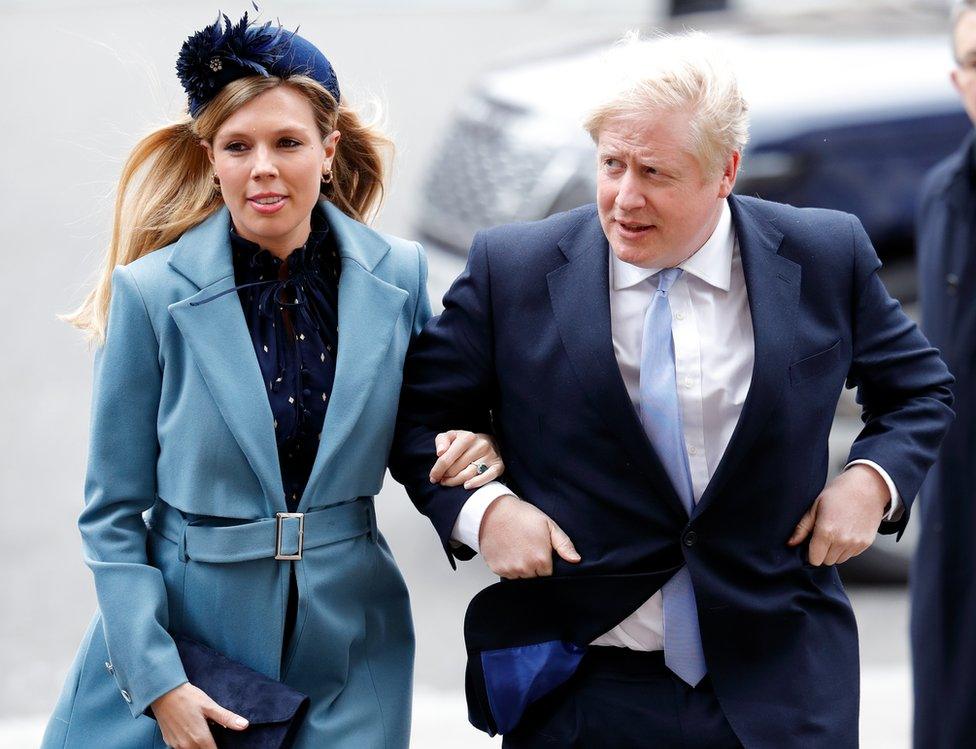
Boris and Carrie Johnson got married in May 2020
In May 2020, Johnson married Carrie Symonds, a former Tory aide, at a private ceremony at Westminster Cathedral. The couple had their first son together, Wilfred, in April 2020. Their second child, daughter Romy, was born in December 2021.
It was Johnson's two terms as London mayor - starting in 2008 - that transformed his political career.
Up until then, he had been stuck in the slow lane, better known as a TV celebrity and comedy turn than a serious politician.
Popularity peaks
His ability to harvest votes from Labour supporters - and project an upbeat, positive vision of Conservativism - made him a powerful electoral asset for his party.
His popularity reached its peak during the 2012 London Olympics, despite, or perhaps because of, being pictured dangling from a zip wire gamely waving a pair of union flags.
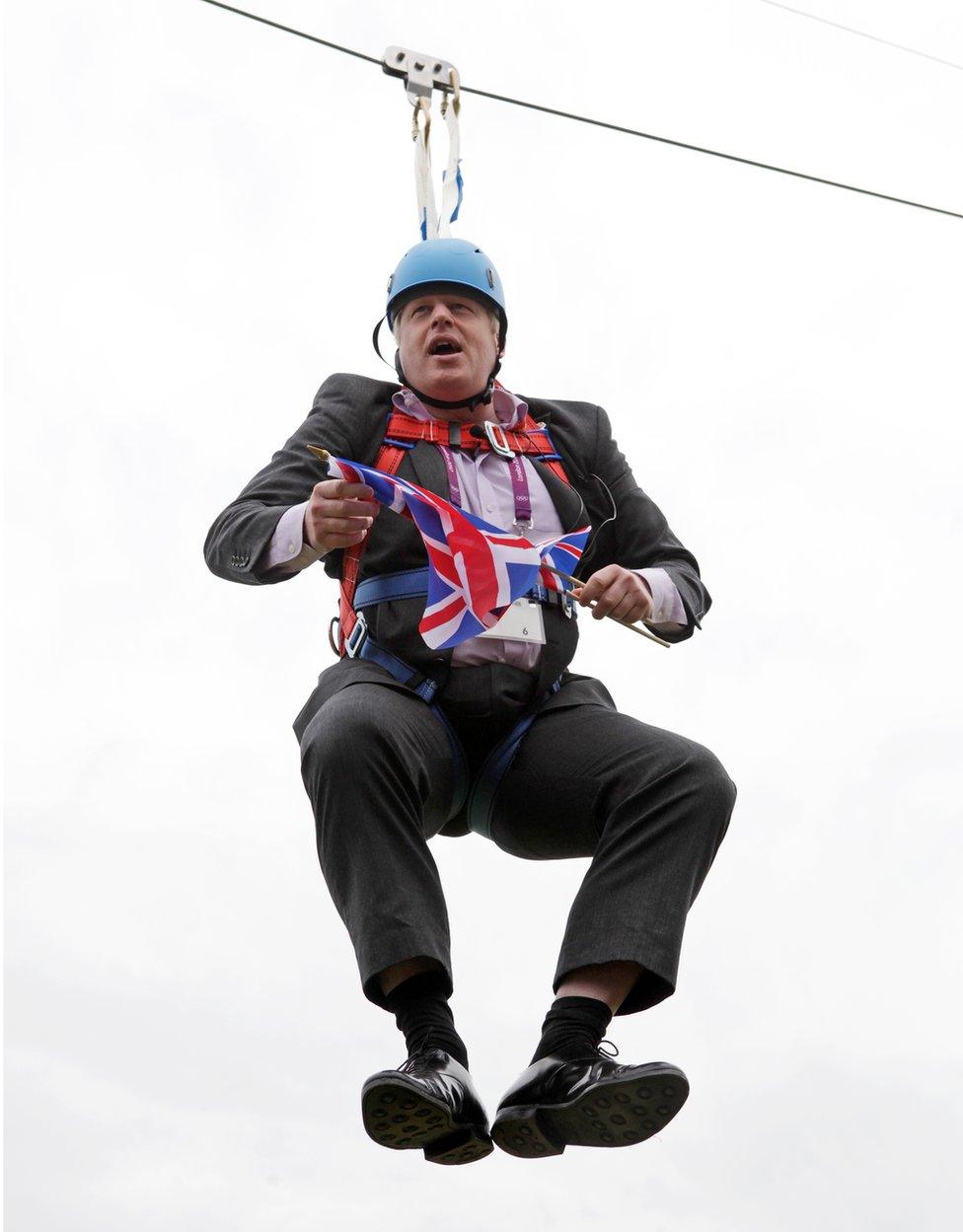
Comic cheerleader: Boris Johnson suspended on a zip wire in a stunt to promote the 2012 London Olympics
In 2015, he returned to Parliament as MP for Uxbridge and South Ruislip, with his sights set on the top job, and a major dilemma. David Cameron's decision to hold an EU referendum was a defining moment for the country, but also for the old friends and rivals.
Johnson's decision - after much agonising - to join forces with the pro-Brexit campaign came as a severe blow to Cameron's hopes of keeping the UK in the EU. But it was seen as a game-changing moment by the pro-Brexit campaign, run by tough-talking strategist Dominic Cummings, a man Cameron had once dismissed as a "career psychopath".
When his side emerged victorious, Johnson threw his hat into the ring to replace Cameron as Conservative leader and prime minister.
However, his campaign was dramatically undermined when colleague and close friend Michael Gove withdrew support and decided to run for the leadership himself, saying he did not think Johnson was up to the job of prime minister.
'Get Brexit Done'
Not for the first time, he was contemplating the end of his political career. Yet in a surprise move Theresa May, the eventual winner, appointed Johnson as foreign secretary.
He quit May's cabinet in 2018, in protest at her Brexit deal, which he claimed would lead Britain into "the status of a colony".
When she was forced to resign as Tory leader the following year, he finally got his hands on the top job.
He was immediately plunged into turmoil, as he battled to govern with the non-existent majority inherited from May.
In an audacious and highly controversial move, later ruled unlawful by the Supreme Court, he attempted to prorogue, or suspend, Parliament, after his attempts to push through a Brexit deal faltered ahead of his own deadline of 31 October 2019.
After two failed attempts to get MPs to vote for a general election, he finally went to the country in December 2019, promising to "Get Brexit Done", a slogan dreamed up by Dominic Cummings, who was now his closest aide.
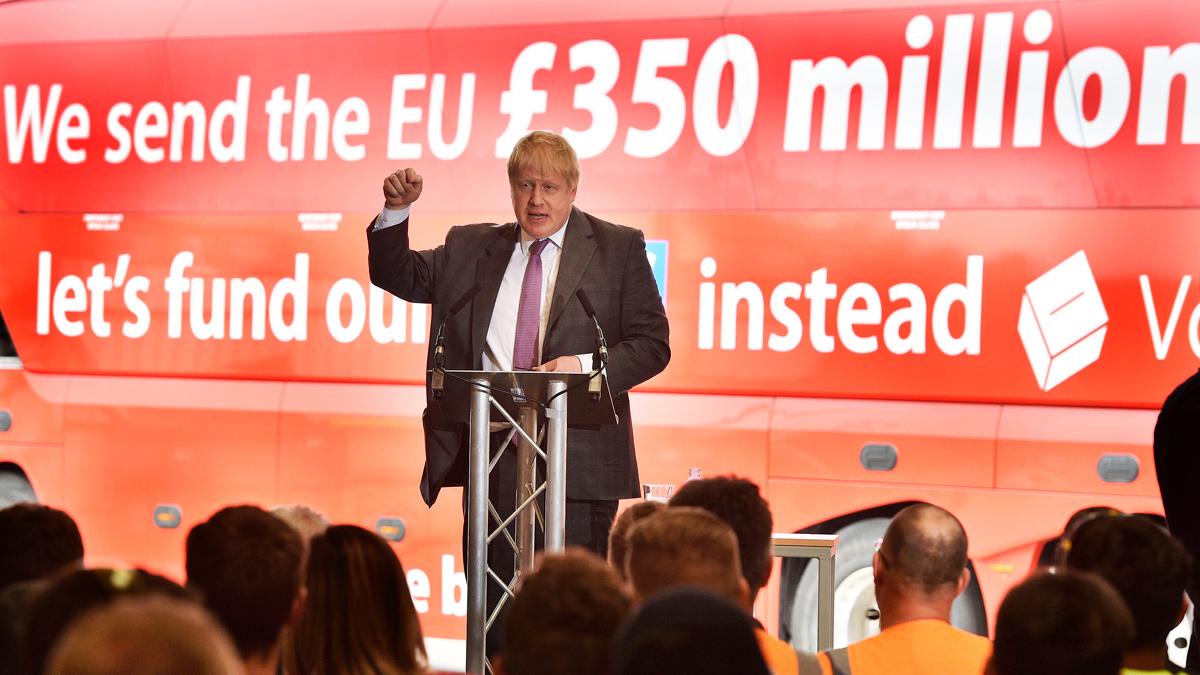
Boris Johnson during the 2016 Brexit campaign in front of a Leave EU bus controversially covered with the words "We send the EU £350 million a week"
The gamble paid off, and he was returned to power with the biggest Conservative majority since Margaret Thatcher's 1980s heyday. Crucially, he had won seats in former Labour strongholds across the North of England, what came to be known as the Red Wall.
His Brexit deal was approved and on 31 January 2020 the UK left the EU.
It looked as though negotiating a trade deal with the EU would be his government's first key task - and Brexit his abiding legacy. But, within weeks, he was engulfed by an all-consuming crisis that few - least of all Mr Johnson - had seen coming: the coronavirus pandemic.
In April 2020, he tested positive for Covid himself and spent three nights in intensive care. Downing Street played down the seriousness of his condition but when he was discharged, the PM admitted "it could have gone either way".
As the UK emerged from the pandemic, Mr Johnson's government was under fire from all sides for its handling of the pandemic.
Booze-fuelled parties
He hailed the success of the UK's vaccine roll-out, which was the fastest in the developed world.
But his political problems were mounting up.
In November 2020, he lost Dominic Cummings and other senior aides after a bout of bitter infighting in Downing Street.
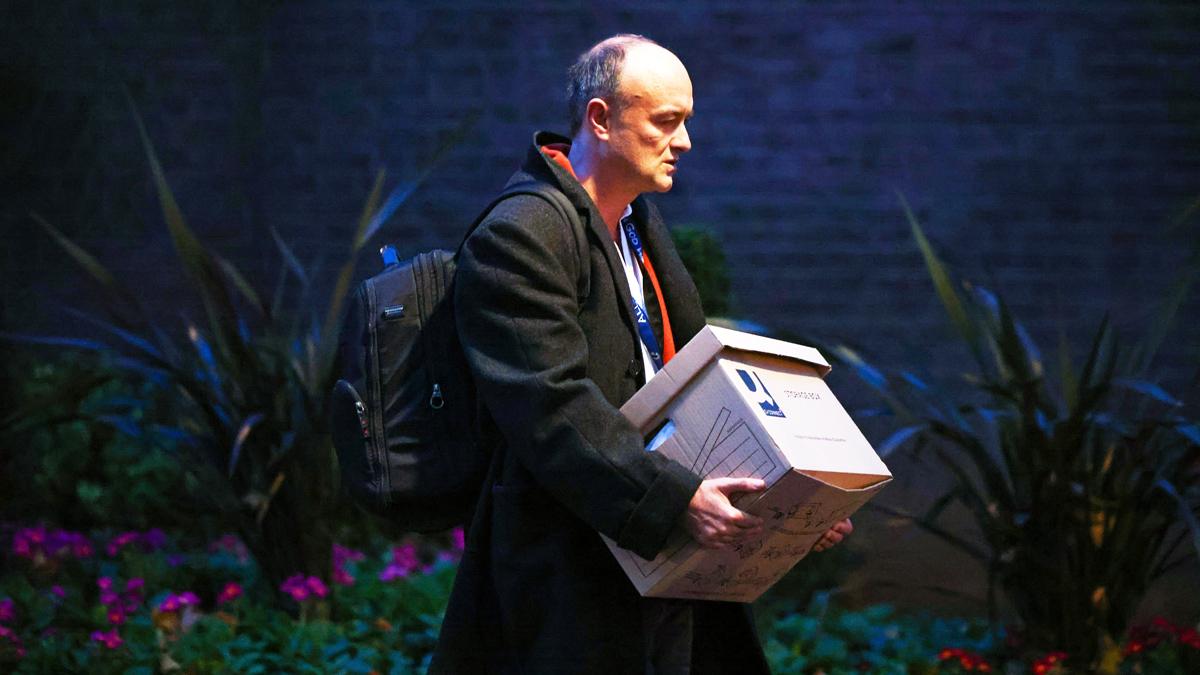
Dominic Cummings leaving Downing Street, November 2020
Worse was to come in November 2021, when the Daily Mirror accused Johnson of breaking Covid rules by attending parties in Downing Street when indoor mixing was banned. There was a further bombshell just over a week later when video footage emerged of Downing Street staff laughing and joking about holding a Christmas party.
Then the Daily Telegraph revealed that Downing Street staff had held booze-fuelled parties the night before the Duke of Edinburgh's funeral. Johnson later apologised to the Queen.
Johnson, his then-Chancellor Rishi Sunak and Carrie Johnson were among those fined by police, while a damning report by senior civil servant Sue Gray laid bare a Downing Street culture of drunkenness and contempt for the rules.
Johnson did his best to sound contrite in public, telling MPs he had learned lessons and had launched a shake-up of backroom staff, but he continued to insist that he had not broken Covid rules on purpose.
By-election defeats
The cabinet rallied round the prime minister, but a steadily growing band of backbench Conservatives, from different wings of the party, had come to the conclusion that he had to go, amid rising public anger.
He survived a confidence motion in June 2022, despite nearly half of his MPs voting against him. But a string of by-election defeats led MPs to fear he had become an electoral liability. The old magic, it seemed, was no longer working.
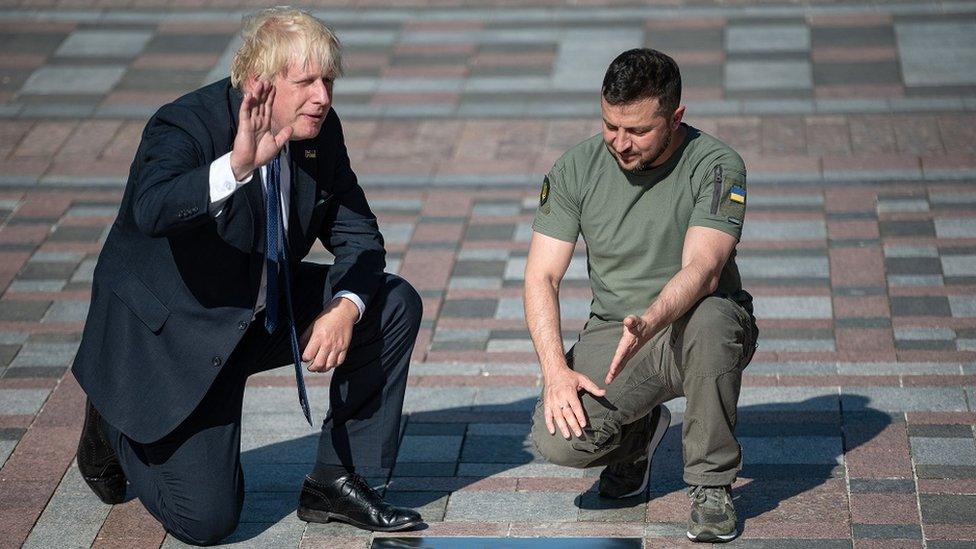
Boris Johnson and has been a staunch supporter of Ukrainian President Volodymyr Zelensky
The final straw for many MPs was when ministers were sent out to defend the prime minister in a row over an MP facing allegations of sexual misconduct, armed with misleading information from Downing Street.
A mass walkout by ministers, including Chancellor Rishi Sunak, followed and after 48 hours of defiance, in which he repeatedly vowed to "get on with the job" of governing, he was finally forced to face up to reality.
He did not go quietly. And within a few short months he would get an unexpected chance to make another comeback, following the spectacular implosion of Liz Truss's premiership.
Loyal supporters
He flew back from a Caribbean holiday in October 2022 to launch a bid to replace Truss, who had won the contest to replace him.
But despite managing to scrape together just enough nominations from Tory MPs to get on the ballot, Johnson pulled out of the contest, paving the way for the coronation of Rishi Sunak, who had far more support in the Parliamentary party.
He insisted he would remain an MP, fuelling rumours that another comeback might be on the cards.
But questions about his conduct during the Covid pandemic refused to go away, with the committee of MPs investigating whether he had lied to Parliament eventually delivering their damning verdict.
Only a fool would write Boris Johnson off entirely - and he retains a band of loyal supporters, who point to his leadership over the war in Ukraine and his espousal of traditional Tory free market values as reasons for his return - not to mention his formidable campaigning skills.
But the road back looks like a long and steep one.